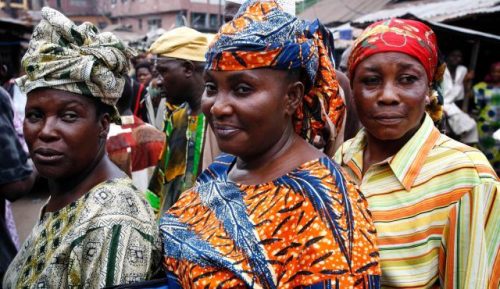
What is it like be an advocate of change for women’s rights and bettering her life conditions in a society in which one in three girls is suffering violence in one way or the other, becoming a victim of sexual harassment, rape or incest before the age of 13? I talked about it to Ms Ope Adedeji.
Child marriages, although banned by Child’s Rights Act from 2003, are still a dull reality of many girls who, in some states are already married by the age of 9. Female Genital Mutilation is still practiced in some parts of the country, mostly 12 northern states that are ruled by Sharialaws. Domestic violence is a serious problem – close to a third of Nigerian women have experienced physical violence, which encompasses battery, marital rape and murder, at the hands of their intimate partners. The same survey also found that half of those women believe a husband is justified in beating his wife for several reasons, including going out without telling him, or neglecting the children. You might wonder why doesn’t the other half simply leave an abusive marriage?
Simple thought, not a simple answer. There is a cultural perception attached to a woman who walks out of a marriage. She is usually stigmatized as a failure and marginalized as promiscuous, so they choose to stay in abusive relationships to keep up appearances. They choose to remain Mrs.
Street sexual harassment as well as disrespect at workplace based on socially adhered gender stereotypes is what women in all castes of society suffer on daily basis.
There is no one way to describe a Nigerian woman. There is a certain revolt in the way they speak, feminine confidence in their attitude and mysticism in a smile that always leaves the impression that they know something more than you, but they choose to keep silent about it. They speak loudly and enjoy polemics, they are rebellious and know how to draw attention. They always look put together because they learned early that girls should be beautiful so they can find a good husband tomorrow. They are beautiful on the outside even when they are broken on the inside – this is one of the consequences of being socialized to mature early and accept the predetermined gender roles.
But, what is it like being a woman in Nigeria?
,,It comes with feelings of being subordinate and secondary. It is the way most women were brought up and socialised in various religious and cultural Nigerian settings. You learn quickly as a girl–child that people tend to place a higher priority on the male gender, especially if you grow up in a home with brothers. It happens in schools too, where a brilliant girl is termed as being ,,too ambitious” when she does better than the boys, as if being too ambitious is a bad thing for a girl”, Ms Ope Adedeji tells me sitting in her office at Ouida Books publishing house in Lagos.
It’s a bit after 7 pm and the night is slowly creeping up in the former capital of Africa’s most populous country counting over 190 million people, 100 million of which are women. Abuja became the new capital of Nigeriain 1976 due to its central geographical position, better infrastructure and easier approachability compared to Lagos which is lying in the southern part of the ,,Giant of Africa”, as many refer to Nigeria. However, Lagos remained the country’s urban, financial and trade hub where young Nigerians from all 36 states come searching for education, better jobs and opportunities.
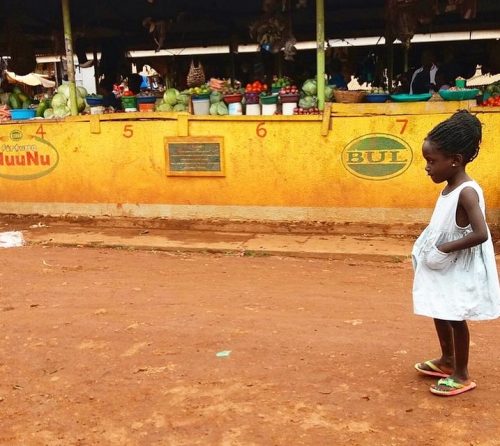
The traffic in Lagos is difficult to cope with. The day ahead needs to be planned with regards to potentially very crowded roads. I didn’t quite understand the severity of this warning friendly Lagosians gave me, which is why Ms Ope patiently waited for me past her office hours. Nevertheless, she welcomed me with a warm smile that left the impression she wasn’t bothered by my poor time management. As we are climbing the wooden stairwell, I am soaking in the smell of new books and freshly printed paper and observing her long, dark hair perfectly braided from the roots and elegantly tucked above the neckline with a simple band. She has a soft, deep voice but her words are sharp and on point. She is a writer, a reader, and a feminist.
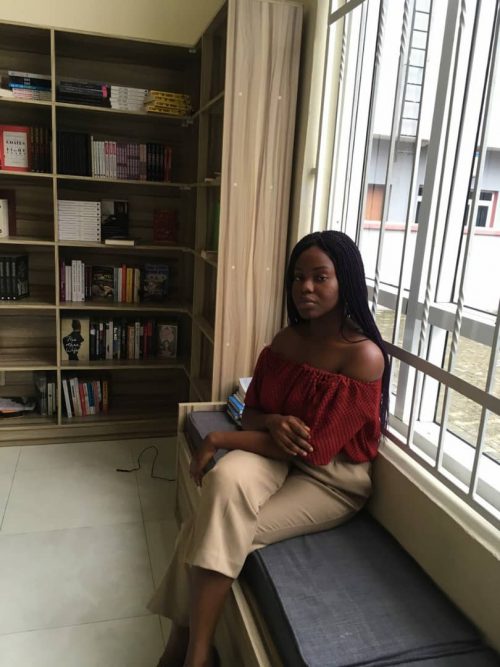
,,Patriarchy is something that is ingrained in the system and women have had to accept. It is only now with social media and a lot of reading, education and travelling that we Nigerian women and especially millennials are identifying it as a patriarchal problem and something that shouldn’t be accepted. It (patriarchy) is an all–consuming venom that is deeply rooted in our religions and culture”, she starts the interview without hesitation.
We use the word ,,feminism” in western world often nowadays. It is a world enriched with socially active and self-conscious young women encouraged to openly speak about the rights for equal pay, equal opportunities, education and throbbing necessity for redefining gender roles. It is a frequent puzzle piece of a narrative that emerges in the ever-changing world of development of human rights that is making the world narrower and goals such as gender equality tangible. Opinions on the topic of feminism differ, but the global discussion is for a long time now out in the open.
However, Nigeria had a different path of development. It must be noted that it is understandable why the dialogue about women’s rights and emancipation in a country so new to the concept of democracy in which its postulates are still being questioned and proven, was not prioritized as ,,urgent”. But it is urgent.
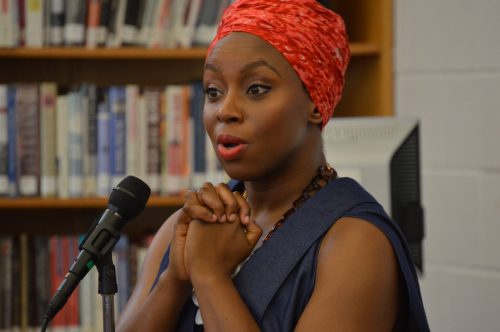 Just listen to Chimamanda Ngozi Adichie, a feminist and author of awarded novel ,,We should all be feminists”, whose work and talks around the globe are encouraging women to speak up and you will understand just how urgent it is. When women don’t talk and share experiences, they might feel like they are alone and isolated in their fears and insecurities. Getting accustomed to the inferior status, being secondary to men and it seems almost genetically predetermined to cook, find a husband and be the good wife serving the dinner on time, is an alarming social atmosphere in which the girls were being brought up for the longest time. Talking about issues shared though the identity of being a woman brings an understanding of common grounds. That is why the talk about feminism is so important.
Just listen to Chimamanda Ngozi Adichie, a feminist and author of awarded novel ,,We should all be feminists”, whose work and talks around the globe are encouraging women to speak up and you will understand just how urgent it is. When women don’t talk and share experiences, they might feel like they are alone and isolated in their fears and insecurities. Getting accustomed to the inferior status, being secondary to men and it seems almost genetically predetermined to cook, find a husband and be the good wife serving the dinner on time, is an alarming social atmosphere in which the girls were being brought up for the longest time. Talking about issues shared though the identity of being a woman brings an understanding of common grounds. That is why the talk about feminism is so important.
It didn’t seem as Nigeria and Montenegro had a lot in common. Ope has never before heard of a small country on the Balkan with the most beautiful sunsets in Boka bay, and I knew vaguely about Nigeria mostly because my grandfather used to repeat the phrase ,,think of the children that were starving in Biafra”, a country that is today erased from the map and existed for a few years in East Nigeria in the late ’60. He would say this when I wouldn’t want to finish the food in my plate and he wanted to awaken the sense of social responsibility, humanity and solidarity in me.
But talking to Ope about boys, girls and gender roles I understood there was a thread that connected Montenegro and Nigeria. We both grew up in countries that celebrate more the birth of a boy than a girl. Having a daughter is wonderful, but having a son – and having a son as your first child is something to be proud of.
,,When you have more female children, the men would do as much as possible to get male children. Sometimes going as far as marrying another woman to try to get boys. It is the most common situation. I’ve had someone tell me, years ago, that my parents are lucky that my brother is the first child since my parents’ 3 subsequent kids were girls. Till today, I do not understand the luck, the value that is placed on having a male child”, Ope shared her experience with me frowning at the absurdity of this idea same way I frowned listening many times when men were being put on a pedestal in Montenegro for the simple fact of being born a man.
Nigeria has long ways to go to overcome the immense gender gap that exists in the society, but more than that to change the mentality of men and women who believe this inequality is simply natural. To close the gender gap we first must change the way we think. Then act on it.
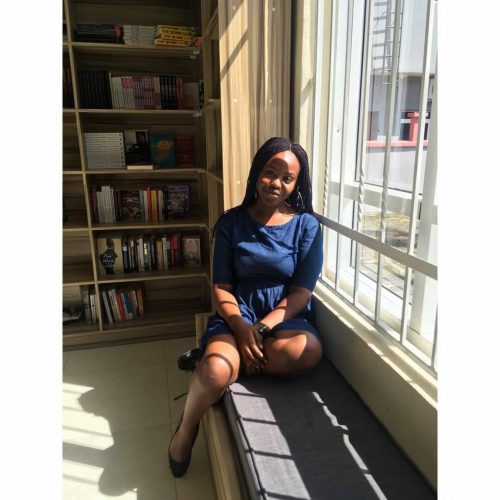
,,A Nigerian woman, before she unlearns gender roles and stereotypes knows that she must be on her best behaviour, that she must act and speak a certain way and most importantly, that she must be at the service of men — from her father to brother, to husband – at all times. To do otherwise would be to be an outcast, unladylike. She feels an obligation to learn how to cook, to be kind, to be warm, to smile. Being a woman in Nigeria means learning to feel like you are ,,property” because your custom believes you are”, says Ope.
Apart from the gender gap, there is another one that is not making the conversation easier-the one born between different generations in the same household that endured different challenges and coped with them in different ways. Ope’s mother started driving at the age of 16, moved out of her parents’ house and was working as a banker at the age of 25, but she never spoke of feminism or women’s rights opposing to her role as a housewife, a mother and a wife at service to her husband. She most likely wouldn’t agree on many feminist values and ideas, thinking they are too ,,western”. But, she did always talk to Ope and her 2 sisters about the importance of financial independence and its benefits and that’s why young girl’s mind was boggled just enough so she starts asking questions. Going to University, Ope actively participated in discussions trying to find answers to the accepted social atmosphere where a woman feels entitled to a man’s money and a man feels entitled to a woman’s body. Soon she started understanding that she was indeed a feminist. But still, until now, Ope never told her mother that it was her preaching about the importance of having her own piece of bread, that sparked her imagination and hunger to understand where the women are and where they should be.
Today, 17,000 babies were born in Nigeria. Of this, slightly less than half are female. These girls have yet to find out which paths they are going to take, with so many crossroads waiting for them. Unfortunately, they will very soon have to understand how many stereotypes and prejudices were born today with them just because tomorrow will be women. Aren’t the 100 million of them living in Nigeria today good enough reason to start changing the status of women in the most populous African country today?
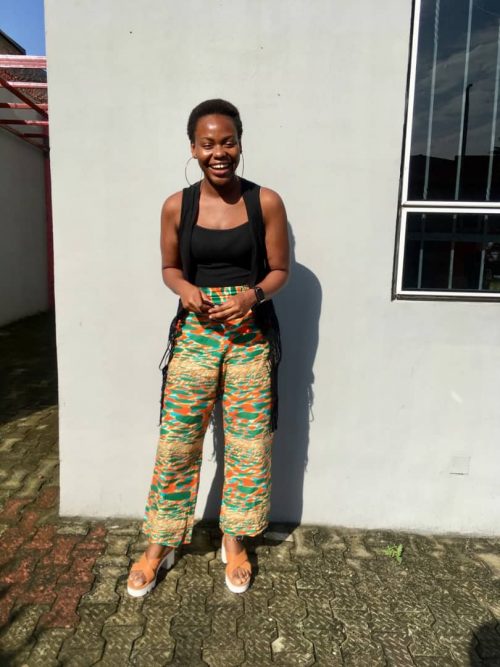
The way Nigerian women appear to us – travelers from different worlds, and the change of the narrative on a global scale leave me feeling that the times for women in West Africa are changing, that feminism is now in the forefront and only awaits its chance to become the norm.

(Marija Rašović, originally from Podgorica, has a degree in journalism obtained at the Faculty of Political Sciences in Belgrade. She completed Masters in Madrid, and now lives and works in Abu Dhabi. And she travels… Her observations poured into words, esteem readers, you will be able to read here, on MNE magazin portal. )


